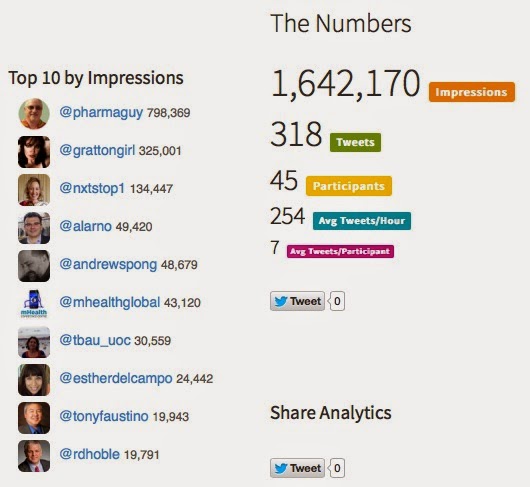Yesterday’s hour-long #mHealthPharma TweetChat on how pharma can develop high quality mobile health apps was a great success. The following Storyline summary was prepared by Teresa Bau (@tbau_uoc), a freelance journalist from Barcelona & Mobile Health Global Editor. You can read my key takeaways below.
There were several “key takeaways” from this conversation that involved 45 participants from around the world. Keep reading to get my summary of the conversation.
Before I get to that, here are some top “influencers” and numbers from the chat session:
One consistent theme expressed by several participants was the need for pharma to involve patients early on in the development of mobile health apps, beginning with the concept stage, in order to understand the true “unmet” needs of patients “beyond the pill.” The following are some of the comments relating to that:
- “In my opinion,” said Bau, “having patient’s perspective into account from the very beginning is key to achieve success.”
- “Get grassroots patients to help design, then they will be more likely to download, use and promote,” said @jeff_greene (Jeff Greene, Partner, Digital Strat Lead at New Solutions Factory).
- @jenniferstarkey (Jennifer Starkey, Analytics and Insights Sr. Manager @Healthline) totally agreed: “Give the patient want they want instead of what pharma wants to give them.”
But is the industry doing this?
- “Truth be told,” said @rdhoble (Rob Dhoble, Mobile Health Strategist, CEO Adherent Health, LLC), “industry rarely co-creates tools collaboration w/actual patients. if they did, apps will improve, guaranteed.
Kelly Wahle, @flywithhope, Migraine patient advocate, said: “Patient advocates have the patients’ best interests at heart and, know what patients would feel comfortable with and what they wouldn’t. They would be the ones that would be familiar with what a person with a chronic illness is going to want in an application.”
An anonymous respondent suggested that “the major patient advocate associations such as American Heart Association, American Cancer Society, American Lung Association and so forth, convene a pharmaceutical round table or some group that is perhaps coordinated by the NIH to look at these apps, and to give some guidance to the drug industry.”
During the chat, @jcornetp (Joan Cornet Prat, Director of mHealth at Mobile World Capital Barcelona) also suggested more than just patients need to be involved: “Healthcare profs should also be involved in the process of app generation. They are the prescriptors and can advise patients…” @mmayerp (MD PhD Family Medicine) agreed: “Patients, designers and profesionals should be involved in the scientific development of #health #app.”
@estherdelcampo (Esther del Campo, Journalist) offered this “formula” for creating useful mobile apps (I’m paraphrasing):
Quality mHealth App = Satisfy Patients’ Needs + Transparency + Health Data Security
However, Dhoble suggested that traditional pharma marketing goals and budgets may be standing in the way: “patients want apps that SIMPLIFY their lives,” said Dhoble “Most Pharma communications are overly complex. Look at how most pharma fund their business units,” he added. “Most $ still spent on Rx acquisition, apps R focused on patient outcomes.” You might like to read this: “Pharma Marketers Focus on Pills, Patient Opinion Leaders Focus on Support.“









![6 Digital Tools at the Center of Healthcare Digitalization [INFOGRAPHIC]](http://ec2-54-175-84-28.compute-1.amazonaws.com/pharma-mkting.com/wp-content/uploads/2021/04/6DigitalTools_600px-100x70.jpg)




